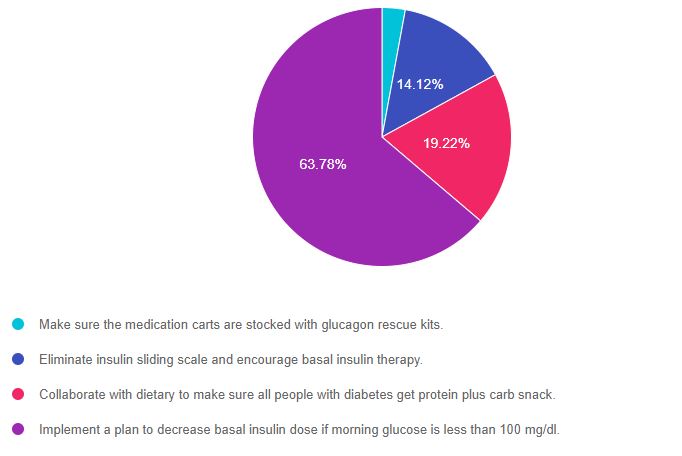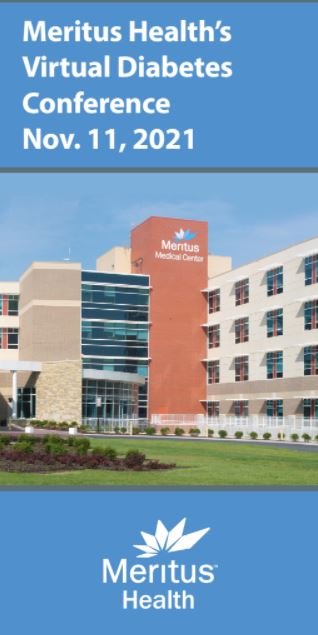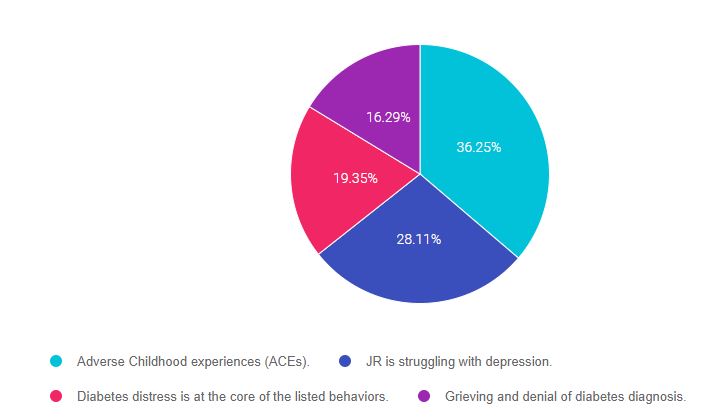Question of Week | What does “Diabetes Mellitus” really mean?

To celebrate National Diabetes Month, our Questions of the Week will challenge test takers on their historical knowledge of the discovery of insulin. Thanks for joining us on this fun adventure.
The term diabetes mellitus is derived from Greek and Latin languages, with roots dating back to the Greek physician Demetrius of Apamea in 129-199 AD.
Which is the most accurate translation of the term diabetes mellitus in English?
- Passing through of honey or sweetness.
- Siphoning of sugared urine.
- Wasting disease due to sweetness.
- Evil urinating disease.
Click Here to Test your Knowledge
Enroll in our Virtual DiabetesEd Specialist Program!
Did you miss the live conference? No worries!
You can register now to watch on-demand
Click here to learn more and get started!
Whether you are new to diabetes or a seasoned expert, you’ll benefit from this virtual conference with the latest research plus critical content that you can immediately apply to your clinical practice.
If you are seeking a state-of-the-art review of current diabetes care, this course is for you. Our team has been fine-tuning this course for over fifteen years, and we know what you need. This program can also be a great addition to your CDCES or BC-ADM exam study plan.
Team of expert faculty includes:
- Diana Isaacs, PharmD, BCPS, BC-ADM, BCACP, CDCES – Educator of the Year, 2020
- Coach Beverly Thomassian, RN, MPH, CDCES, BC-ADM
- Ashley LaBrier, MS, RD, CDCES, Diabetes Program Coordinator
In addition to informative lectures, we also use group activities and case studies to highlight the essential knowledge, skills, and strategies needed to succeed in diabetes education today!
CEs: Includes over 30 CEs
Program Info: 2021 Diabetes Educator Course Flyer & Schedule (subject to change)
Speakers: View Conference Faculty.
Dates: Your registration fee includes access to FREE podcast and all recorded webinars for one year.
Virtual DiabetesEd Specialist Conference Deluxe | Recorded & Ready for Viewing! | 30+ CEs
Deluxe Virtual Program for $459 includes:
- Presentations by our team of experts
- Q & A Session with the instructor after each webinar
- State-of-the-art review of current diabetes care and technology.
- Resources for each session
- Access to FREE podcast and recorded webinars within a week of each live session for one full year.
+Plus Syllabus, Standards and Swag:
- Diabetes Educator Course 2021 Syllabus Hard Copy – over 100 pages -This spiral-bound workbook contains the printed version of all of the instructor’s slides.
- DiabetesEd Services highlighters, Medication PocketCard and Pen
2021 Diabetes Educator Course Flyer & Schedule (subject to change)
Team of Experts: Our team of expert faculty has been fine-tuning this course for over fifteen years and we know what you need to succeed! In addition to informative lectures, we also use group activities and case studies to highlight the essential knowledge, skills, and strategies needed to succeed in diabetes education today!
Bonus Courses worth 12+ CEs, FREE
When you register for our Virtual Course, you have immediate access to these Bonus DiabetesEd University Online Courses – for FREE!
- Test Taking Toolkit – Over 200 sample test questions!
- Level 2 – Assessing and Promoting Well-Being: From Population Health to a Person-Centered Approach 1.5 CEs
- Level 2 – Hospital and Hyperglycemia 1.5 CEs
- Level 2 – Hyperglycemic Crisis, DKA and HHS Standards 1.0 CEs
- Level 2 – Meds Management Update for Type 2 – 1.5 CEs
- Level 2 – Setting up a Successful Diabetes Program 1.5 CEs
- Level 2 – Pregnancy and Diabetes 1.5 CEs
- Level 2 – From Tots to Teens – Diabetes Standards 1.5 CEs
- Level 2 – Older Adults and Diabetes 1.5 CEs
- Mindfulness and Compassion in the Diabetes Encounter – 1.0 CE
2021 Diabetes Educator Course Flyer & Schedule (subject to change)
Sign up for Diabetes Blog Bytes – we post one daily Blog Byte from Monday to Friday. And of course, Tuesday is our Question of the Week. It’s Informative and FREE! Sign up below!
[yikes-mailchimp form=”1″]Accreditation: Diabetes Education Services is an approved provider by the California Board of Registered Nursing, Provider 12640, and Commission on Dietetic Registration (CDR), Provider DI002. Since these programs are approved by the CDR it satisfies the CE requirements for the CDCES regardless of your profession.*
The use of DES products does not guarantee the successful passage of the CDCES exam. CBDCE does not endorse any preparatory or review materials for the CDCES exam, except for those published by CBDCE.
Rationale of the Week | Best strategy to Prevent Hypo in Hospital?

Our September 28th Question of the week quizzed test takers on the best strategy to prevent hypo in the hospital. 64% of respondents, chose the best answer. We are excited to share info so you can pass on helpful info to people living with diabetes and your hospital colleagues.
Before we start though, if you don’t want any spoilers and haven’t tried the question yet, you can answer below: Answer Question
Question: As a diabetes specialist at a local hospital, one of your quality improvement goals is to prevent nocturnal hypoglycemia.
Which of the of following policy changes would most likely lower rates of overnight and morning hypoglycemia?
Answer Choices:
- Make sure the medication carts are stocked with glucagon rescue kits.
- Eliminate insulin sliding scale and encourage basal insulin therapy.
- Collaborate with dietary to make sure all people with diabetes get protein plus carb snack.
- Implement a plan to decrease basal insulin dose if morning glucose is less than 100 mg/dl.

As shown above, the most common choice was option 4, the second most common answer was option 3, then option 2, and finally option 1.
Getting to the Best Answer
If you are thinking about taking the certification exam, it is helpful to know the goals of care and considerations for people with diabetes in the acute care setting. This practice test question will set you up for success. Test writers anticipate possible answers based on the details in the question. They will wave those “juicy answers” that seem so familiar to you, right under your nose. Your job is to weed through the to choose the BEST answer.
Answer 1 is incorrect. 2.88% chose this answer, “Make sure the medication carts are stocked with glucagon rescue kits.” Since the question is asking “what policy changes would most likely lower rates of overnight and morning hypoglycemia“, this is answer does not address the problem in the question; what policy change would PREVENT hypoglycemia. Having glucagon rescue meds would treat hypoglycemia, but not prevent it.
Answer 2 is incorrect. 14.12% of you chose this answer, “Eliminate insulin sliding scale and encourage basal insulin therapy.” It is true that the ADA does not recommend insulin sliding scale for inpatient management of diabetes since it is not an effective way to manage hyperglycemia. In addition, since sliding scale is usually administered with meals, it is not the most likely culprit causing morning hypoglycemia. Generally speaking, too much basal insulin is usually the cause of morning hypoglycemia. So stopping the sliding scale and encouraging basal insulin, is not the BEST answer to address the question and reduce morning hypoglycemia.
Answer 3 is incorrect. 19.22% of respondents chose this answer, “Collaborate with dietary to make sure all people with diabetes get protein plus carb snack.” Studies have shown that providing a carb snack at bedtime can decrease risk of nocturnal and morning hypoglycemia. But, if the basal insulin dose is too much, the person could still experience hypoglycemia, even with a carb snack. P.S, adding protein has not been shown to sustain the action of the carb and enhance hypoglycemia prevention. We never want to “feed” the insulin. We always want to give the least amount of insulin to get glucose to target and keep people safe.
Finally, Answer 4 is correct. 63.78% chose this answer, “Implement a plan to decrease basal insulin dose if morning glucose is less than 100 mg/dl.” YES, this is the BEST Answer. GREAT JOB. To keep inpatients safe, creating a policy that notifies the medical team when the morning glucose level is less than 100 mg/dL coupled with a reduction of basal insulin dose, would be an effective strategy to prevent morning hypoglycemia.
We hope you appreciate this week’s rationale! Thank you so much for taking the time to answer our Question of the Week and participate in this fun learning activity!
Enroll in our Virtual DiabetesEd Specialist Program!
Did you miss the live conference? No worries!
You can register now to watch on-demand
Click here to learn more and get started!
Whether you are new to diabetes or a seasoned expert, you’ll benefit from this virtual conference with the latest research plus critical content that you can immediately apply to your clinical practice.
If you are seeking a state-of-the-art review of current diabetes care, this course is for you. Our team has been fine-tuning this course for over fifteen years, and we know what you need. This program can also be a great addition to your CDCES or BC-ADM exam study plan.
Team of expert faculty includes:
- Diana Isaacs, PharmD, BCPS, BC-ADM, BCACP, CDCES – Educator of the Year, 2020
- Coach Beverly Thomassian, RN, MPH, CDCES, BC-ADM
- Ashley LaBrier, MS, RD, CDCES, Diabetes Program Coordinator
In addition to informative lectures, we also use group activities and case studies to highlight the essential knowledge, skills, and strategies needed to succeed in diabetes education today!
CEs: Includes over 30 CEs
Program Info: 2021 Diabetes Educator Course Flyer & Schedule (subject to change)
Speakers: View Conference Faculty.
Dates: Your registration fee includes access to FREE podcast and all recorded webinars for one year.
Virtual DiabetesEd Specialist Conference Deluxe | Recorded & Ready for Viewing! | 30+ CEs
Deluxe Virtual Program for $459 includes:
- Presentations by our team of experts
- Q & A Session with the instructor after each webinar
- State-of-the-art review of current diabetes care and technology.
- Resources for each session
- Access to FREE podcast and recorded webinars within a week of each live session for one full year.
+Plus Syllabus, Standards and Swag:
- Diabetes Educator Course 2021 Syllabus Hard Copy – over 100 pages -This spiral-bound workbook contains the printed version of all of the instructor’s slides.
- DiabetesEd Services highlighters, Medication PocketCard and Pen
2021 Diabetes Educator Course Flyer & Schedule (subject to change)
Team of Experts: Our team of expert faculty has been fine-tuning this course for over fifteen years and we know what you need to succeed! In addition to informative lectures, we also use group activities and case studies to highlight the essential knowledge, skills, and strategies needed to succeed in diabetes education today!
Bonus Courses worth 12+ CEs, FREE
When you register for our Virtual Course, you have immediate access to these Bonus DiabetesEd University Online Courses – for FREE!
- Test Taking Toolkit – Over 200 sample test questions!
- Level 2 – Assessing and Promoting Well-Being: From Population Health to a Person-Centered Approach 1.5 CEs
- Level 2 – Hospital and Hyperglycemia 1.5 CEs
- Level 2 – Hyperglycemic Crisis, DKA and HHS Standards 1.0 CEs
- Level 2 – Meds Management Update for Type 2 – 1.5 CEs
- Level 2 – Setting up a Successful Diabetes Program 1.5 CEs
- Level 2 – Pregnancy and Diabetes 1.5 CEs
- Level 2 – From Tots to Teens – Diabetes Standards 1.5 CEs
- Level 2 – Older Adults and Diabetes 1.5 CEs
- Mindfulness and Compassion in the Diabetes Encounter – 1.0 CE
2021 Diabetes Educator Course Flyer & Schedule (subject to change)
Sign up for Diabetes Blog Bytes – we post one daily Blog Byte from Monday to Friday. And of course, Tuesday is our Question of the Week. It’s Informative and FREE! Sign up below!
[yikes-mailchimp form=”1″]Accreditation: Diabetes Education Services is an approved provider by the California Board of Registered Nursing, Provider 12640, and Commission on Dietetic Registration (CDR), Provider DI002. Since these programs are approved by the CDR it satisfies the CE requirements for the CDCES regardless of your profession.*
The use of DES products does not guarantee the successful passage of the CDCES exam. CBDCE does not endorse any preparatory or review materials for the CDCES exam, except for those published by CBDCE.
November eNews | Diabetes Month Celebration & FREE Webinars
FREE Webinar | Getting to the Gut (& Skin), Meet Your Microbiome, Nov. 9th
Join the wonderment as we explore the role of our Microbiome.
Airs live on November 9th at 11:30 am PST

This seventy-five-minute complimentary journey will expand your view of how trillions of bacterial hitchhikers profoundly influence our health. We will discuss how foods, bathing, the environment, and our medical practices have impacted our gut bacteria over time and strategies we can take to protect these old friends. Join us!
New content and exciting research findings!
Join the wonderment as we explore the role of our Microbiome.
2021 Webinar Topics
- Discuss the latest research on our microbiome
- Describe the link between COVID and Gut-Lung Axis
- Discuss the implications of the skin microbiome and overall health
- Describe the importance of diet during pregnancy for the baby’s microbiome.
- State the relationship between gut health and diabetes and inflammation
- Describe 3 strategies to get our microbiome back to better health.
This webinar is free and you can view at any time, on any device. If you want to earn CEs, you can purchase this course on our online university below.
Getting to the Gut – Meet Your Microbiome
Getting to the Gut Webinar – Earn 1.25 CE – $19.00 (usually $29)
Presented By: Gutsy Bev and the Microbials Beverly Thomassian RN, MPH, CDCES, BC-ADM is a working educator and a nationally recognized diabetes expert for over 25 years.
- Bacteria Rap by Gutsy Bev and the Microbials
- Download the Gut Bacteria Rap lyrics
Feedback from a recent participant: “This Webinar New Horizon is filled with Bev’s energy, knowledge, and passion for diabetes that she replicates in all her teachings. She puts a demand on herself to be a mentor to all. Her information is well organized, full of current/relevant research, and helps CDCES’ * view into future as a changing world impacts diabetics. I find her to be the most exciting and engaging educator and … OUTSTANDING teacher!!” This webcast is completely free because we love sharing exciting information with our community! However, if you would like CEs you can purchase the individual course or as part of a series.
Enroll in our Virtual DiabetesEd Specialist Program!
Did you miss the live conference? No worries!
You can register now to watch on-demand
Click here to learn more and get started!
Whether you are new to diabetes or a seasoned expert, you’ll benefit from this virtual conference with the latest research plus critical content that you can immediately apply to your clinical practice.
If you are seeking a state-of-the-art review of current diabetes care, this course is for you. Our team has been fine-tuning this course for over fifteen years, and we know what you need. This program can also be a great addition to your CDCES or BC-ADM exam study plan.
Team of expert faculty includes:
- Diana Isaacs, PharmD, BCPS, BC-ADM, BCACP, CDCES – Educator of the Year, 2020
- Coach Beverly Thomassian, RN, MPH, CDCES, BC-ADM
- Ashley LaBrier, MS, RD, CDCES, Diabetes Program Coordinator
In addition to informative lectures, we also use group activities and case studies to highlight the essential knowledge, skills, and strategies needed to succeed in diabetes education today!
CEs: Includes over 30 CEs
Program Info: 2021 Diabetes Educator Course Flyer & Schedule (subject to change)
Speakers: View Conference Faculty.
Dates: Your registration fee includes access to FREE podcast and all recorded webinars for one year.
Virtual DiabetesEd Specialist Conference Deluxe | Recorded & Ready for Viewing! | 30+ CEs
Deluxe Virtual Program for $459 includes:
- Presentations by our team of experts
- Q & A Session with the instructor after each webinar
- State-of-the-art review of current diabetes care and technology.
- Resources for each session
- Access to FREE podcast and recorded webinars within a week of each live session for one full year.
+Plus Syllabus, Standards and Swag:
- Diabetes Educator Course 2021 Syllabus Hard Copy – over 100 pages -This spiral-bound workbook contains the printed version of all of the instructor’s slides.
- DiabetesEd Services highlighters, Medication PocketCard and Pen
2021 Diabetes Educator Course Flyer & Schedule (subject to change)
Team of Experts: Our team of expert faculty has been fine-tuning this course for over fifteen years and we know what you need to succeed! In addition to informative lectures, we also use group activities and case studies to highlight the essential knowledge, skills, and strategies needed to succeed in diabetes education today!
Bonus Courses worth 12+ CEs, FREE
When you register for our Virtual Course, you have immediate access to these Bonus DiabetesEd University Online Courses – for FREE!
- Test Taking Toolkit – Over 200 sample test questions!
- Level 2 – Assessing and Promoting Well-Being: From Population Health to a Person-Centered Approach 1.5 CEs
- Level 2 – Hospital and Hyperglycemia 1.5 CEs
- Level 2 – Hyperglycemic Crisis, DKA and HHS Standards 1.0 CEs
- Level 2 – Meds Management Update for Type 2 – 1.5 CEs
- Level 2 – Setting up a Successful Diabetes Program 1.5 CEs
- Level 2 – Pregnancy and Diabetes 1.5 CEs
- Level 2 – From Tots to Teens – Diabetes Standards 1.5 CEs
- Level 2 – Older Adults and Diabetes 1.5 CEs
- Mindfulness and Compassion in the Diabetes Encounter – 1.0 CE
2021 Diabetes Educator Course Flyer & Schedule (subject to change)
Sign up for Diabetes Blog Bytes – we post one daily Blog Byte from Monday to Friday. And of course, Tuesday is our Question of the Week. It’s Informative and FREE! Sign up below!
[yikes-mailchimp form=”1″]Accreditation: Diabetes Education Services is an approved provider by the California Board of Registered Nursing, Provider 12640, and Commission on Dietetic Registration (CDR), Provider DI002. Since these programs are approved by the CDR it satisfies the CE requirements for the CDCES regardless of your profession.*
The use of DES products does not guarantee the successful passage of the CDCES exam. CBDCE does not endorse any preparatory or review materials for the CDCES exam, except for those published by CBDCE.
How is “Diabetes Remission” Really Defined?
“I just want to get rid of my diabetes”, is something I frequently hear when people are newly diagnosed with diabetes.
Can people with type 2 get rid of their diabetes? Well, not exactly, but a small percentage of people with type 2 can achieve normoglycemia, especially after metabolic surgery or significant weight loss. However, over time, blood sugars often rise again. That is why diabetes isn’t “cured” or fixed. Keep reading to learn the new standardized term and ongoing screening guidelines.
What is the right term to use when blood sugars normalize, even with type 2 diabetes?

A new consensus statement designed to answer this question was issued by the American Diabetes Association, the Endocrine Society, the European Association for the Study of Diabetes, and Diabetes UK last month.
The 12-member panel recognized that we have no standard term to describe the phenomenon of prolonged normoglycemia in people previously diagnosed with type 2 diabetes, who are not using glucose-lowering medications.
Terms like “reversal”, “resolution”, or “cure”, are frequently used to describe this phenomenon and are sometimes are associated with unsubstantiated claims.
The new standardized term is “remission”.
Diabetes remission defined – A1c< 6.5% for at least 3 months after stopping glucose-lowering pharmacotherapy. This definition holds true whether attained by lifestyle changes, metabolic surgery, or other means,
When A1c is not a reliable marker of glycemic control (due to anemia, hemoglobinopathies, or others), fasting plasma glucose <126 mg/dL or estimated A1C <6.5% calculated from CGM values can be used.
With this standardized definition, researchers will be able to conduct studies and analyze medical records using standard terminology so they can accurately compare factors that help people with type 2 achieve remission and factors that influence remission duration.
A1c Testing still needed if in Remission?
Even if people are experiencing remission, they require continued glucose evaluation because hyperglycemia frequently recurs. People in remission who experience weight gain, are started on steroids or other medications like atypical antipsychotics or meds to treat HIV, may exhibit elevated blood glucose levels. In addition, stress from other forms of illness and the natural decline of beta-cell function over time can all lead to the recurrence of Type 2 diabetes. Testing of A1c or another measure of glycemic levels needs to be performed at least yearly.
Metabolic Memory – people in diabetes remission still experience complications.
Even after a remission, the classic complications of diabetes including retinopathy, nephropathy, neuropathy, and enhanced risk of cardiovascular disease can still occur due to metabolic memory.
Diabetes Care Consensus Report 2021
The metabolic memory or legacy effect is relevant in this setting. If a person with diabetes has a history of hyperglycemia, this metabolic memory can cause persisting harmful effects in various tissues. Even after remission, the classic complications of diabetes including retinopathy, nephropathy, neuropathy, and enhanced risk of cardiovascular disease can still occur. This is why it is important for people in diabetes remission to have regular retinal screening, tests of renal function, foot evaluation, and measurement of blood pressure and weight in addition to ongoing monitoring of A1c.
To read the complete article from Diabetes Care, Aug 2021, Consensus Report: Definition and Interpretation of Remission in Type 2 Diabetes.
Are you preparing for the CDCES Exam?
Join us live on November 4th, for our FREE Webinar
Starting your journey to becoming a CDCES? We recommend watching our FREE Preparing for CDCES Exam Webinar!
This course will transform your test anxiety into calm self-confidence and test-taking readiness.
Webinar Topics
- Exam requirement updates for 2021.
- Exam eligibility and test format
- Strategies to succeed along with a review of study tips and test-taking tactics.
- We will review sample test questions and the reasoning behind choosing the right answers.
- Learn how to focus your time and prepare to take the CDCES Exam. We provide plenty of sample test questions and test-taking tips!
Can’t join us live?
Don’t worry, we will send you a link to the recorded version.
What is a Certified Diabetes Care and Education Specialist?
Read More: What is a CDCES? First awarded in 1986, as Certified Diabetes Educator (CDE) credential and in 2020 with a new name: Certified Diabetes Care and Education Specialist (CDCES) to more accurately reflect the specialty. CDCES has become a standard of excellence for the delivery of quality diabetes education. Those who hold this certification are known to possess comprehensive knowledge of and experience in diabetes prevention, management, and prediabetes. “Becoming a Certified Diabetes Care and Education Specialist (CDCES) is one of the best professional and personal decisions I have ever made.” – Coach Beverly Thomassian, RN, MPH, CDCES, BC-ADM
Why become a CDCES?
Three Reasons from Coach Beverly
Read More: 3 Reasons to Become a CDCES “The best part of becoming a CDCES is working with my colleagues and people living with diabetes. As diabetes educators, we hear compelling and beautiful life stories. I am astounded by the barriers they face and inspired by their adaptability, problem-solving skills, and resilience.” Reason 1: CDCES is a widely recognized certification by employers and health care professionals throughout the U.S. This credential demonstrates a specialized and in-depth knowledge in the prevention and treatment of individuals living with pre-diabetes and diabetes. Reason 2: Currently, 10% of people in the U.S. have diabetes and another 35% have pre-diabetes which means 45% of Americans are running around with elevated blood glucose levels. Given this epidemic, there will be plenty of future job opportunities. Reason 3: Having my CDCES along with my nursing degree, has opened many doors of opportunity; from working as an inpatient Diabetes Nurse Specialist in a hospital to working as a Manager of Diabetes Education in the outpatient setting to starting my own consulting company.
Sign up for Diabetes Blog Bytes – we post one daily Blog Byte from Monday to Friday. And of course, Tuesday is our Question of the Week. It’s Informative and FREE! Sign up below!
[yikes-mailchimp form=”1″]Accreditation: Diabetes Education Services is an approved provider by the California Board of Registered Nursing, Provider 12640, and Commission on Dietetic Registration (CDR), Provider DI002. Since these programs are approved by the CDR it satisfies the CE requirements for the CDCES regardless of your profession.*
The use of DES products does not guarantee the successful passage of the CDCES exam. CBDCE does not endorse any preparatory or review materials for the CDCES exam, except for those published by CBDCE.
Question of the Week | First Insulin Injections in Humans – What is true?

To celebrate National Diabetes Month, our Questions of the Week will challenge test takers on their historical knowledge of the discovery of insulin. Thanks for joining us on this fun adventure.
Which of the following statements is true regarding the first experiments using insulin in humans?
- Since insulin worked successfully on dogs, no experimentation was needed on humans to gain approval.
- Leonard Thompson, a 14-year-old received the first successful insulin injection in January 1922.
- The initial insulin was derived from the exocrine cells of ligated canine and porcine pancreases.
- Elizabeth Hughes was the first insulin recipient in 1921 but the insulin formulation didn’t work to lower her glucose until 1922.
Click Here to Test your Knowledge
Enroll in our Virtual DiabetesEd Specialist Program!
Did you miss the live conference? No worries!
You can register now to watch on-demand
Click here to learn more and get started!
Whether you are new to diabetes or a seasoned expert, you’ll benefit from this virtual conference with the latest research plus critical content that you can immediately apply to your clinical practice.
If you are seeking a state-of-the-art review of current diabetes care, this course is for you. Our team has been fine-tuning this course for over fifteen years, and we know what you need. This program can also be a great addition to your CDCES or BC-ADM exam study plan.
Team of expert faculty includes:
- Diana Isaacs, PharmD, BCPS, BC-ADM, BCACP, CDCES – Educator of the Year, 2020
- Coach Beverly Thomassian, RN, MPH, CDCES, BC-ADM
- Ashley LaBrier, MS, RD, CDCES, Diabetes Program Coordinator
In addition to informative lectures, we also use group activities and case studies to highlight the essential knowledge, skills, and strategies needed to succeed in diabetes education today!
CEs: Includes over 30 CEs
Program Info: 2021 Diabetes Educator Course Flyer & Schedule (subject to change)
Speakers: View Conference Faculty.
Dates: Your registration fee includes access to FREE podcast and all recorded webinars for one year.
Virtual DiabetesEd Specialist Conference Deluxe | Recorded & Ready for Viewing! | 30+ CEs
Deluxe Virtual Program for $459 includes:
- Presentations by our team of experts
- Q & A Session with the instructor after each webinar
- State-of-the-art review of current diabetes care and technology.
- Resources for each session
- Access to FREE podcast and recorded webinars within a week of each live session for one full year.
+Plus Syllabus, Standards and Swag:
- Diabetes Educator Course 2021 Syllabus Hard Copy – over 100 pages -This spiral-bound workbook contains the printed version of all of the instructor’s slides.
- DiabetesEd Services highlighters, Medication PocketCard and Pen
2021 Diabetes Educator Course Flyer & Schedule (subject to change)
Team of Experts: Our team of expert faculty has been fine-tuning this course for over fifteen years and we know what you need to succeed! In addition to informative lectures, we also use group activities and case studies to highlight the essential knowledge, skills, and strategies needed to succeed in diabetes education today!
Bonus Courses worth 12+ CEs, FREE
When you register for our Virtual Course, you have immediate access to these Bonus DiabetesEd University Online Courses – for FREE!
- Test Taking Toolkit – Over 200 sample test questions!
- Level 2 – Assessing and Promoting Well-Being: From Population Health to a Person-Centered Approach 1.5 CEs
- Level 2 – Hospital and Hyperglycemia 1.5 CEs
- Level 2 – Hyperglycemic Crisis, DKA and HHS Standards 1.0 CEs
- Level 2 – Meds Management Update for Type 2 – 1.5 CEs
- Level 2 – Setting up a Successful Diabetes Program 1.5 CEs
- Level 2 – Pregnancy and Diabetes 1.5 CEs
- Level 2 – From Tots to Teens – Diabetes Standards 1.5 CEs
- Level 2 – Older Adults and Diabetes 1.5 CEs
- Mindfulness and Compassion in the Diabetes Encounter – 1.0 CE
2021 Diabetes Educator Course Flyer & Schedule (subject to change)
Sign up for Diabetes Blog Bytes – we post one daily Blog Byte from Monday to Friday. And of course, Tuesday is our Question of the Week. It’s Informative and FREE! Sign up below!
[yikes-mailchimp form=”1″]Accreditation: Diabetes Education Services is an approved provider by the California Board of Registered Nursing, Provider 12640, and Commission on Dietetic Registration (CDR), Provider DI002. Since these programs are approved by the CDR it satisfies the CE requirements for the CDCES regardless of your profession.*
The use of DES products does not guarantee the successful passage of the CDCES exam. CBDCE does not endorse any preparatory or review materials for the CDCES exam, except for those published by CBDCE.
Preparing for the CDCES Exam FREE Webinar | November 4th, 2021
Are you preparing for the CDCES Exam?
Join us live on November 4th, for our FREE Webinar
Starting your journey to becoming a CDCES? We recommend watching our FREE Preparing for CDCES Exam Webinar!
This course will transform your test anxiety into calm self-confidence and test-taking readiness.
Webinar Topics
- Exam requirement updates for 2021.
- Exam eligibility and test format
- Strategies to succeed along with a review of study tips and test-taking tactics.
- We will review sample test questions and the reasoning behind choosing the right answers.
- Learn how to focus your time and prepare to take the CDCES Exam. We provide plenty of sample test questions and test-taking tips!
Can’t join us live?
Don’t worry, we will send you a link to the recorded version.
What is a Certified Diabetes Care and Education Specialist?
Read More: What is a CDCES? First awarded in 1986, as Certified Diabetes Educator (CDE) credential and in 2020 with a new name: Certified Diabetes Care and Education Specialist (CDCES) to more accurately reflect the specialty. CDCES has become a standard of excellence for the delivery of quality diabetes education. Those who hold this certification are known to possess comprehensive knowledge of and experience in diabetes prevention, management, and prediabetes. “Becoming a Certified Diabetes Care and Education Specialist (CDCES) is one of the best professional and personal decisions I have ever made.” – Coach Beverly Thomassian, RN, MPH, CDCES, BC-ADM
Why become a CDCES?
Three Reasons from Coach Beverly
Read More: 3 Reasons to Become a CDCES “The best part of becoming a CDCES is working with my colleagues and people living with diabetes. As diabetes educators, we hear compelling and beautiful life stories. I am astounded by the barriers they face and inspired by their adaptability, problem-solving skills, and resilience.” Reason 1: CDCES is a widely recognized certification by employers and health care professionals throughout the U.S. This credential demonstrates a specialized and in-depth knowledge in the prevention and treatment of individuals living with pre-diabetes and diabetes. Reason 2: Currently, 10% of people in the U.S. have diabetes and another 35% have pre-diabetes which means 45% of Americans are running around with elevated blood glucose levels. Given this epidemic, there will be plenty of future job opportunities. Reason 3: Having my CDCES along with my nursing degree, has opened many doors of opportunity; from working as an inpatient Diabetes Nurse Specialist in a hospital to working as a Manager of Diabetes Education in the outpatient setting to starting my own consulting company.
Join us live on November 11th for the upcoming
Meritus Health’s Virtual Diabetes Conference
Diabetes in the 21st Century with Coach Beverly

Join us live on November 11th from 8:00 am to 4:00 pm for our Virtual Conference: Diabetes in the 21st Century | 6.5 CEs
This conference offers comprehensive presentations on care of a person with diabetes examining a variety of evidence-based topics to aid in the care of a person with diabetes.
Click here to download the program flyer.
Location: Virtual
Fees: No charge for Meritus Health Employees. $50.00 for Non-Meritus Health Participants Meritus Health Employees: Please register via Healthstream, using keyword search “21st Century” or by clicking here.
Cancellation Policy: If you must cancel, please notify Ruth Leizear by phone at 301-790-8619 or toll free at 888-803-1518.
Check-in: Check-in starts at 8:00 a.m., please log in 15 minutes prior to the first presentation
Accreditation:
- Registered Nurses: Nursing Education Department of Meritus Health is accredited with distinction as a provider of nursing continuing professional development by the American Nurses Credentialing Center’s Commission on Accreditation.
6.5 ANCC Contact Hours will be awarded; No partial credit will be given. - Dieticians: Approved for 6.5 CPE II for Registered Dietitians by the Commission on Dietetic Registration.
Click here to download the program flyer.
Instructor: Beverly Thomassian RN, MPH, CDCES, BC-ADM is a working educator and a nationally recognized diabetes expert.
Sign up for Diabetes Blog Bytes – we post one daily Blog Byte from Monday to Friday. And of course, Tuesday is our Question of the Week. It’s Informative and FREE! Sign up below!
[yikes-mailchimp form=”1″]Accreditation: Diabetes Education Services is an approved provider by the California Board of Registered Nursing, Provider 12640, and Commission on Dietetic Registration (CDR), Provider DI002. Since these programs are approved by the CDR it satisfies the CE requirements for the CDCES regardless of your profession.*
The use of DES products does not guarantee the successful passage of the CDCES exam. CBDCE does not endorse any preparatory or review materials for the CDCES exam, except for those published by CBDCE.
Rationale of the Week | “My life is a mess”

Our October 19th Question of the week quizzed test takers on a person who is clearly in crisis. 36% of respondents, chose the best answer. We feel it is important to share this rationale of the week, so you can advocate for people struggling with mental health while trying to manage their diabetes.
Before we start though, if you don’t want any spoilers and haven’t tried the question yet, you can answer below: Answer Question
Question: JR is 26 years old with newly diagnosed diabetes. JR keeps missing appointments and when you finally get a hold of them on the phone, they start crying and say “my life is a mess”. JR is struggling with addiction, periods of houselessness and extra weight in addition to diabetes.
Based on this information, what is the most likely barrier to JR engaging in self-care?
Answer Choices:
- Adverse Childhood experiences (ACEs)
- JR is struggling with depression
- Diabetes distress is at the core of the listed behaviors
- Grieving and denial of diabetes diagnosis

As shown above, the most common choice was option 4, the second most common answer was option 1, then option 2, and finally option 3.
Getting to the Best Answer
If you are thinking about taking the certification exam, it is helpful to know the goals of care and mental health considerations for people with diabetes . This practice test question will set you up for success. Test writers anticipate possible answers based on the details in the question. They will wave those “juicy answers” that seem so familiar to you, right under your nose. Your job is to weed through the to choose the BEST answer.
Answer 1 is correct. 36.25% chose this answer, “Adverse Childhood Experiences (ACEs).” YES, Good job, this is the BEST Answer. JR is missing appointments and when you finally get a hold of them, they say, “my life is a mess”. In addition, we know that JR is struggling with addiction, periods of houselessness and extra weight in addition to diabetes. These are all signs that JR has lived through adverse childhood experiences and toxic stress. By addressing this and providing resources, we can help JR move toward healing. See our ACE Resource page for more info.
Answer 2 is incorrect. 28.11% of you chose this answer, “JR is struggling with depression.” Is this situation, depression can be considered, but we don’t hear the hallmark statements associated with depression – “Loss of pleasure in things that used to bring them joy or feeling down or hopeless”. ACE’s are a better match for what JR is describing. See our Psychosocial Care Resource Page– for articles and screening tools.
Answer 3 is incorrect. 19.35% of respondents chose this answer, “Diabetes distress is at the core of the listed behaviors.” Is this situation, diabetes distress certainly can be considered, but it doesn’t seem to be the driving force behind JR’s struggle with addiction, periods of houselessness and extra weight. Diabetes distress is more heavily associated with diabetes specific related behaviors (fear of hypo, provider doesn’t understand my diabetes, etc.). See our Psychosocial Care Resource Page– for articles and the diabetes distress screening tool.
Finally, Answer 4 is incorrect. 16.29% chose this answer, “Grieving and denial of diabetes diagnosis.” Is this situation, grieving and denial can certainly can be considered, but it doesn’t seem to be the driving force behind JR’s struggle with addiction, periods of houselessness and extra weight. Diabetes denial is more heavily associated with lack of self-care; not checking blood glucose, avoiding medications, eating “whatever”. We don’t hear any of that from this person. The best explanation is that JR has lived through adverse childhood experiences and toxic stress. By addressing this and providing resources, we can help JR move toward healing. See our ACE Resource page for more info.
We hope you appreciate this week’s rationale! Thank you so much for taking the time to answer our Question of the Week and participate in this fun learning activity!
Want to learn about this important topic?
Join Coach Bev for an honest conversation on
The Impact of Adverse Childhood Experiences on Health
Adverse childhood experiences (ACE) are associated with an increased risk of diabetes, heart disease, cancer and a variety of other health consequences for adults. This session reviews how diabetes care and education specialists can provide screening, assessment, and trauma-informed care to individuals who experienced ACEs and are living with toxic stress. We will explore strategies to address ACES and improve outcomes for individuals and communities. Throughout, we will focus on supporting self-care with a focus on recognizing and promoting resilience.
Topics include:
- Discuss the benefits of assessing Adverse Childhood Experiences (ACE) in individuals with diabetes.
- State the relationship between ACE Scores and risk of future health complications.
- Describe a person-centered approach to fostering resilience and self-care for individuals with toxic stress.
- Identify two strategies to provide trauma-informed care in your work setting.
2 Ways to Join the Webinar
This includes access to the recorded version of this webinar on your Online University Student Portal and 1.0 CE.
Intended Audience: This course is a knowledge-based activity designed for individuals or groups of diabetes educators, including RNs, RDs, Pharmacists, Nurse Practitioners, Clinical Nurse Specialists, Physician Assistants, and other health care providers interested in enhancing their diabetes medication knowledge.
Instructor: Beverly Thomassian RN, MPH, CDCES, BC-ADM is a working educator and a nationally recognized diabetes expert.
Sign up for Diabetes Blog Bytes – we post one daily Blog Byte from Monday to Friday. And of course, Tuesday is our Question of the Week. It’s Informative and FREE! Sign up below!
[yikes-mailchimp form=”1″]Accreditation: Diabetes Education Services is an approved provider by the California Board of Registered Nursing, Provider 12640, and Commission on Dietetic Registration (CDR), Provider DI002. Since these programs are approved by the CDR it satisfies the CE requirements for the CDCES regardless of your profession.*
The use of DES products does not guarantee the successful passage of the CDCES exam. CBDCE does not endorse any preparatory or review materials for the CDCES exam, except for those published by CBDCE.











